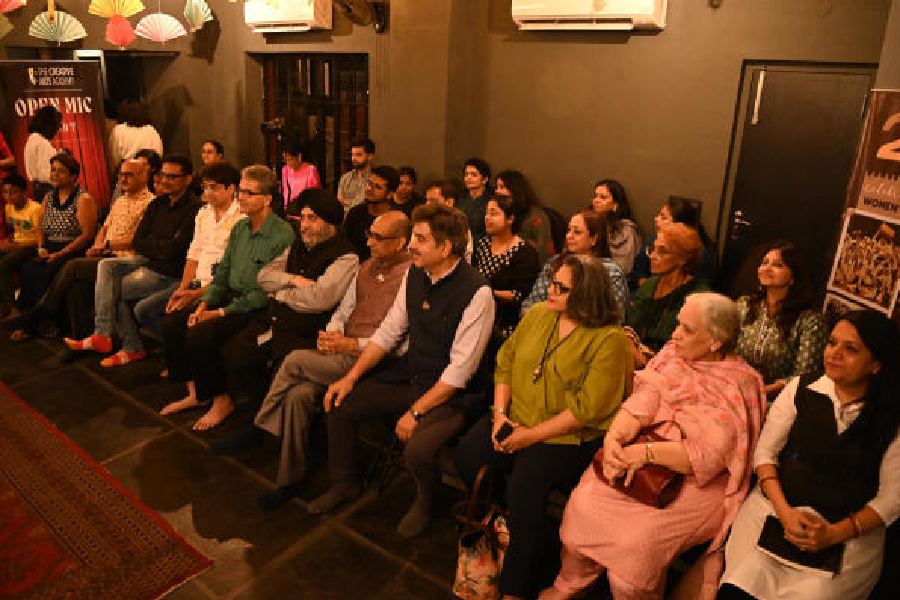The contribution of the common person in fostering amity is often forgotten, a descendant of a nawab told a city audience on Saturday evening.
Shahanshah Mirza, a descendant of Wajid Ali Shah, the last ruler of Awadh who was deposed to Kolkata by the British, was part of a programme to celebrate India’s plurality.
He shared a personal story — that went many decades back — of how his daughter became very good friends with a girl from a “Hindu Marwari” family in a convent school she went to. Soon, Mirza’s family became friends with the girl’s family. Home visits were exchanged during Holi, Diwali and Id.
Though very fond of the girl’s parents, Mirza often wondered how a Marwari family, usually stereotyped as very conservative, was so free with a Muslim family. The secret was one day revealed by the grandmother of the Hindu girl.
Her husband worked at a textile mill in Metiabruz and they stayed at the mill’s quarters. In the middle of a communal flare-up, the couple were once stranded in the middle of a road “as bombs were being hurled”. They sought shelter in a home. After being let in, they realised it was a Muslim home.
“They were scared to death. Every time they heard utensils clinking in the kitchen, they thought a knife was being unsheathed. An elderly man in the family talked to them at length and, after a while, when the violence seemed to have abated, offered to walk them to the quarters,” Mirza told the audience at a studio in south Kolkata.
“He led them through serpentine by-lanes and the couple’s fears were aggravated. They thought they would be taken to a deserted place and murdered. They were in fact saying their final goodbyes to one another when they suddenly saw the main road dotted with cops. Their guide pointed to the quarters and took their leave,” he said.
“The incident left a strong impact on the family. They started thinking about Muslims differently. They shredded their misconceptions about the community. Often, we tend to attribute communal amity to institutions, to Western education and great leaders. But we must not forget the contribution of the common man, like the elderly Muslim man who hosted the couple,” said Mirza.
Ironically, he shared the story — that ended with a loud cheer — at a meet that was titled Mere Ghar Aake To Dekho (Visit my home, be my guest), a campaign of inter-community visits across the country around Independence Day to combat the growing atmosphere of hate.
A socio-cultural organisation, ANHAD, is collaborating with hundreds of national networks and secular and democratic groups to organise the campaign. The target is to ensure one lakh families spread across the country visit each other on August 15 and set in motion an effort to foster love and understanding among different communities.
Saturday’s programme, at The Creative Arts Academy, a multi-disciplinary arts centre on Sadananda Road, marked the launch of the Kolkata leg of the campaign.
People from different communities came together to share anecdotes, personal stories and poems. The evening culminated in a potluck feast. The participants had brought food from their kitchen and broke bread together. Dal baati churma, idli, kheer, vada pav, litti chokha, sandesh and korma, the table was a mini-India in itself.
Amrit Kaur Sabharwal, 76, the vice-chairperson of Guru Nanak Fifth Centenary School in Mussoorie and a leader of Sikh Nari Manch, a social organisation, spoke on Guru Nanak’s teachings of universal brotherhood and amity.
“All the problems happen because of pre-conceived notions about one another. Visiting each others’ homes and interactions can cure all these problems. Guru Nanak always talked of universal well-being (sarbat da bhala). Let us pledge to accept each other with love,” said Sabharwal, an alumnus of the Sophia Senior Secondary School in Ajmer.
Kamal Raza, who works in a hotel in central Kolkata, recited a poem. A rough translation: “In the aspiration to achieve something in the race of life, people are bogged down with concerns of food, money and business. The selfish government of the country is oblivious to the situation despite knowing everything. Hanuman and azaan keep making news headlines. Helpless Indians are not Hindus, Muslims, Sikhs or Christians. They are just human beings.”
Ramanjit Kaur, one of the organisers of the programme in Kolkata and the founder-director of The Creative Arts Academy, said: “Boundaries are not just those created on the basis of religion. They extend to those imagined on the basis of caste, ethnicity, marital status, gender, sexual preference, economic strata, profession and so on.”
The other organiser, Imran Zaki, of Faces, said: “It is heartening to see people from different walks coming together for the event. It gives us hope that we are creating a more inclusive and less discriminatory world for our future generations.”
